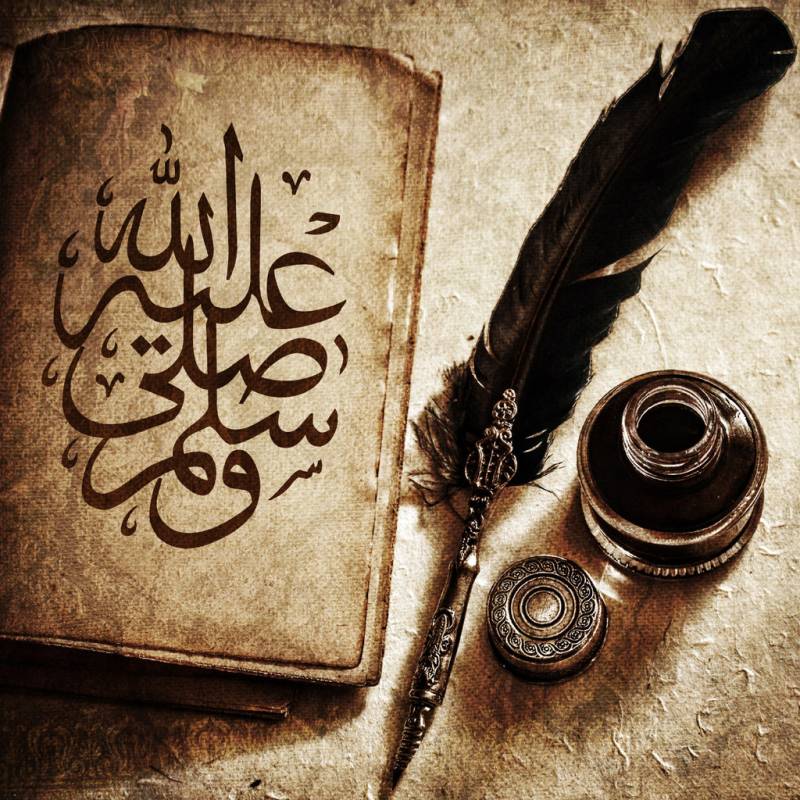Centuries before the advent of Islam, the Arabian peninsula was home to tribes of impoverished Bedouins. Here, in the harsh, endless desert, they had no material possessions of any value. What they owned could be wrapped up and placed on the backs of their camels. But they did not think themselves poor. For they did possess something of immense value. It could not be seen or touched. But it could be heard. It was their language.
And those who could speak Arabic with eloquence and power - the poets - were honoured and cherished. Whenever a new poet emerged in a tribe, word spread rapidly across the desert. People would travel from afar to hear the newcomer. And his tribe would gain honour and respect because of him. Mythical powers were attributed to great poets. It was a good omen to be extolled by one. And misfortune to be lampooned. It is said about one of the great satirical poets that a thief stole some of his camels and refused to return them. As a last resort the poet threatened to lampoon him in verse. The camels were promptly returned.
During the spring, sprawling literary festivals would be held. The most famous of these was the ‘Souk Ukaaz’ which was held near the city of Taif. The tribes would show up with their best poets to compete. Recitals would be held. A panel of judges composed of poets of repute and distinction would rate the competitors. The occasion took on the character of a market fair. Vendors would set up their stalls. Jugglers and musicians would display their skills. Makeshift pubs would serve up liquor hauled on camels from distant corners of the peninsula. And, of course, poets would present their newest compositions.
In these pre Islamic days writing was not common. All poetry was memorized. Every poet had an official reciter - ‘rawiya’ in Arabic - who would memorize all of his master’s poetry, and for whom he would often serve as a stand in. It is said that some of these rawiyas had memorized hundreds of thousands of verses. In the absence of pen and paper, memories were sharp. Arabic developed as a spoken, not written language. It was heard, not read, by people who came to acquire the keenest of appreciation for the spoken word.
Arabia was a land time had forgotten. History had passed it by. The great Roman and Persian empires were steadily extending their influence. They had little interest or time for the arid sparsely populated wasteland that was Arabia. And so it seemed that Arabic would forever remain the exclusive, coveted and cherished preserve of the Bedouins.
Then everything changed. A man emerged from the tribe of Quraish in the valley of Makkah claiming to be the prophet of a single God. The Bedouins were not impressed. They had their own gods - statues made of stone and wood - and they were not interested in talk of a God they could not see or touch.
But then something strange happened. The man - the prophet - started to recite verses from the Quran - literally, ‘the reading’ - which he claimed to have received from his god. The Bedouins, connoisseurs extraordinaire of the spoken word, recognized instinctively that these verses were nothing like they had ever heard before, even from their greatest poets. It seemed to them that this cascading symphony of words could not be of human origin. And so it was the quality of Quranic Arabic that in large part convinced the ancient Arabs that Muhammad (PBUH) was in fact who he claimed to be - a prophet of the one God.
From now on there was no stopping the spread of Arabic. Within a century of the Prophet’s death, Islam had conquered half the known world. The Persian empire was overrun. The Romans were pushed back to the cold recesses of Europe whence they emerged. With Islam went Arabic. And wherever it went it completely supplanted local languages in a way that had never happened before, or has happened since.
The Arab world today extends from Mauritania on the shores of the Atlantic Ocean to the Sudan and Yemen on the edge of the Arabian Sea. And the people who live in this vast region are a melting pot of ethnicities and religions. Yet they are all known today as Arabs. Not even a vestige remains of the many languages their ancestors spoke before the advent of Arabic.
In colonial times, the British and French empires covered vast parts of the globe. And English and French remain widely spoken in their former colonies. But the original languages of these territories were not supplanted and their inhabitants can hardly be called English or French.
That Arabic spread the way it did would not have surprised the ancient poets of ‘Souk Ukaaz’. After all they knew, before anyone else, that their language was priceless.
The writer is Chairman of Mustaqbil Pakistan and an M.A. in Arabic.
Friday, April 19, 2024
Arabic

The writer is Chairman of Mustaqbil Pakistan
Minister advocates for IT growth with public-private collaboration
9:57 PM | April 19, 2024
Formula 1 returns to China for Round 5
9:05 PM | April 19, 2024
Germany head coach Julian Nagelsmann extends contract till 2026 World Cup
9:00 PM | April 19, 2024
IMF urges Italy, France to spend less, Germany to loosen purse strings
8:57 PM | April 19, 2024
Empowering Women: The Vision of Maryam Nawaz Sharif
8:37 PM | April 19, 2024
A Tense Neighbourhood
April 19, 2024
Dubai Underwater
April 19, 2024
X Debate Continues
April 19, 2024
Hepatitis Challenge
April 18, 2024
IMF Predictions
April 18, 2024
Kite tragedy
April 19, 2024
Discipline dilemma
April 19, 2024
Urgent plea
April 19, 2024
Justice denied
April 18, 2024
AI dilemmas unveiled
April 18, 2024
ePaper - Nawaiwaqt
Advertisement
Nawaiwaqt Group | Copyright © 2024





